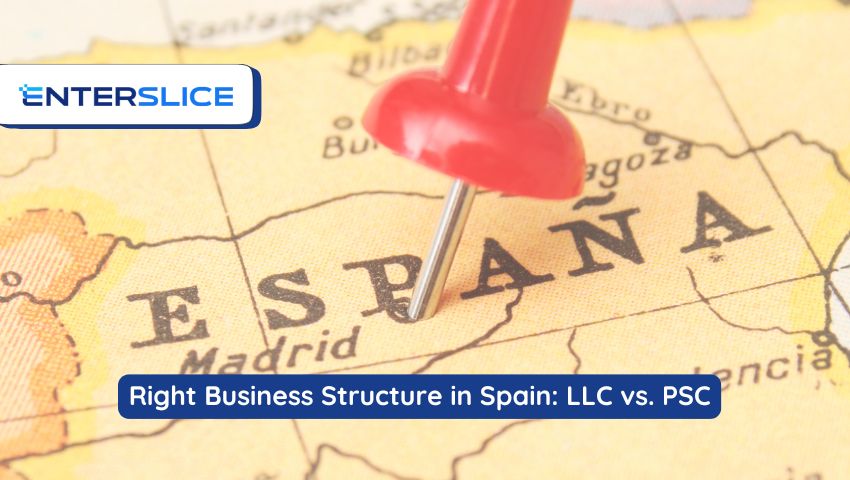Choosing the Right Business Structure in Spain: LLC vs. PSC

Starting a business in Spain can open doors to one of Europe’s largest markets, full of opportunity and innovation. Whether you’re launching a startup in Barcelona, opening a tech branch in Madrid, or expanding into the European Union, your first step should be choosing the right legal structure for your business.
Spain offers multiple company types, but two of the most common options for foreign and local entrepreneurs are the Limited Liability Company (LLC), known locally as Sociedad de Responsabilidad Limitada (SL), and the Public Limited Company (PSC), or Sociedad Anónima (SA).
In this article, we’ll guide you through the differences between these two structures, so you can make a confident, informed decision during your company registration in Spain. Whether you’re looking to register a company in Spain for local operations or use it as a base for wider EU activity, understanding your options is key.
Why Choose Spain for Your Business?
Spain offers a strategic location, a highly skilled workforce, and access to the entire EU market. It also has a growing tech and startup ecosystem, strong infrastructure, and a high quality of life that attracts global talent.
If you’re considering company formation in Spain, you’ll benefit from:
- Full access to the European single market
- A robust legal and regulatory framework
- Government support for foreign investment and innovation
- Competitive corporate tax rates and treaties to avoid double taxation
However, success begins with choosing the legal entity that best suits your goals. Let’s explore the two most common ones.
Limited Liability Company (LLC / SL)
The Sociedad de Responsabilidad Limitada (SL) is the go-to structure for small to medium-sized businesses in Spain. It’s straightforward to set up, relatively inexpensive, and offers limited liability to its shareholders, making it a favorite among entrepreneurs.
Key features:
- Minimum share capital: €3,000 (must be fully paid upon incorporation)
- One or more shareholders (can be individuals or companies)
- Shareholders’ liability is limited to their capital contributions
- Cannot issue publicly traded shares
- Simpler corporate governance compared to PSC
This structure is perfect if you’re launching a service company, eCommerce store, a consultancy, or a branch of a foreign firm. If your focus is operational efficiency over public fundraising, SL is likely the best fit.
Advantages:
- Quick and cost-effective setup
- Less regulatory burden
- Full foreign ownership allowed
- Suitable for most industries and business sizes
Public Limited Company (PSC / SA)
The Sociedad Anónima (SA) is typically used for larger businesses or companies planning to raise capital through public or institutional investors. It has more complex governance and higher capital requirements, but it allows for greater flexibility and credibility in financial markets.
Key features:
- Minimum share capital: €60,000 (only 25% must be paid up at formation)
- Requires a board of directors or a sole administrator
- Can issue publicly traded shares
- Allows more complex ownership structures
- Typically used by large corporations, banks, or companies preparing for IPOs
The SA structure is ideal if you’re planning to attract external investors, operate in highly regulated sectors, or position your company for long-term growth on a larger scale.
Advantages:
- Attracts institutional and public investors
- Offers scalable governance and shareholding
- Provides greater transparency for stakeholders
- Better suited for international expansion or large contracts
LLC vs. PSC: What’s the Right Fit for You?
The right business structure depends on your goals, growth strategy, and how much control and complexity you’re willing to manage.
Here’s a side-by-side comparison:
| Feature | LLC (SL) | PSC (SA) |
|---|---|---|
| Minimum Share Capital | €3,000 | €60,000 |
| Shareholder Requirements | 1 or more | 1 or more |
| Public Share Issuance | Not allowed | Allowed |
| Governance Requirements | Simple (can have 1 administrator) | Board of directors required |
| Tax Rate (Corporate) | 25% standard | 25% standard |
| Time to Incorporate | Usually 1–2 weeks | 2–4 weeks |
| Best for | SMEs, startups, foreign branches | Large corporations, IPOs, scale-ups |
If you’re just starting out or managing a lean international expansion, the LLC/SL gives you everything you need to operate effectively in Spain. If you’re building something with long-term investor backing, or preparing for large-scale contracts or public exposure, the SA may be the better fit.
The Company Formation Process in Spain
Whether you’re setting up an LLC or a PSC, the process to register a company in Spain follows a similar path with some differences in documentation and compliance.
Here’s what you can expect:
- Get a NIE (Foreign Tax ID Number): Required for all shareholders and directors.
- Reserve your company name: Through the Central Mercantile Registry.
- Open a corporate bank account: Deposit share capital.
- Sign incorporation deeds: In front of a Spanish notary.
- Register the company: At the Commercial Registry (Registro Mercantil).
- Obtain a CIF (Tax Identification Code): From the Tax Agency (Agencia Tributaria).
- Register for social security and licenses: Depending on business type.
The entire process can take 2–4 weeks, and it’s common for foreign founders to work with legal and administrative specialists to ensure everything runs smoothly.
Taxation and Legal Obligations
Corporate tax in Spain is set at a standard 25%, with some incentives available for new companies and startups during their first years. VAT is generally 21%, and companies must submit periodic tax filings and annual accounts.
LLCs have fewer reporting obligations, while PSCs must comply with stricter governance and public reporting, especially if they are listed or seeking investment.
Make sure to account for:
- Corporate tax filings
- VAT registration
- Annual account submissions
- Employment and payroll compliance if hiring staff
Having local legal and accounting support is highly recommended.
Final Thoughts
Choosing between an LLC and PSC in Spain is one of the first and most crucial decisions you’ll make when launching or expanding your business here. It impacts everything from how much capital you need, to how you raise funds, and how your business is perceived in the market.
For most entrepreneurs looking for operational efficiency, flexibility, and simplicity, an LLC (SL) offers the right balance. If you’re aiming for larger-scale operations, investor backing, or public trading, the PSC (SA) structure is designed to support those ambitions.
At every step, whether you’re figuring out how to register a company in Spain or seeking help with long-term strategy, it’s important to work with local experts who understand the legal and financial landscape. That way, you can focus on building your business with confidence.
FAQs
1. Can foreigners fully own a company in Spain?
Yes, Spain allows full foreign ownership of both LLCs and PSCs. You’ll just need a NIE (Foreign ID Number) and a local registered office.
2. How long does it take to complete company registration in Spain?
On average, the process takes 2 to 4 weeks, depending on the type of company and how prepared your documentation is.
3. Do I need to visit Spain to register a company?
While it’s possible to set up a company remotely via power of attorney, visiting Spain can help expedite certain steps like signing deeds or opening a bank account.
Also Read: Understanding Foreign Ownership in China





